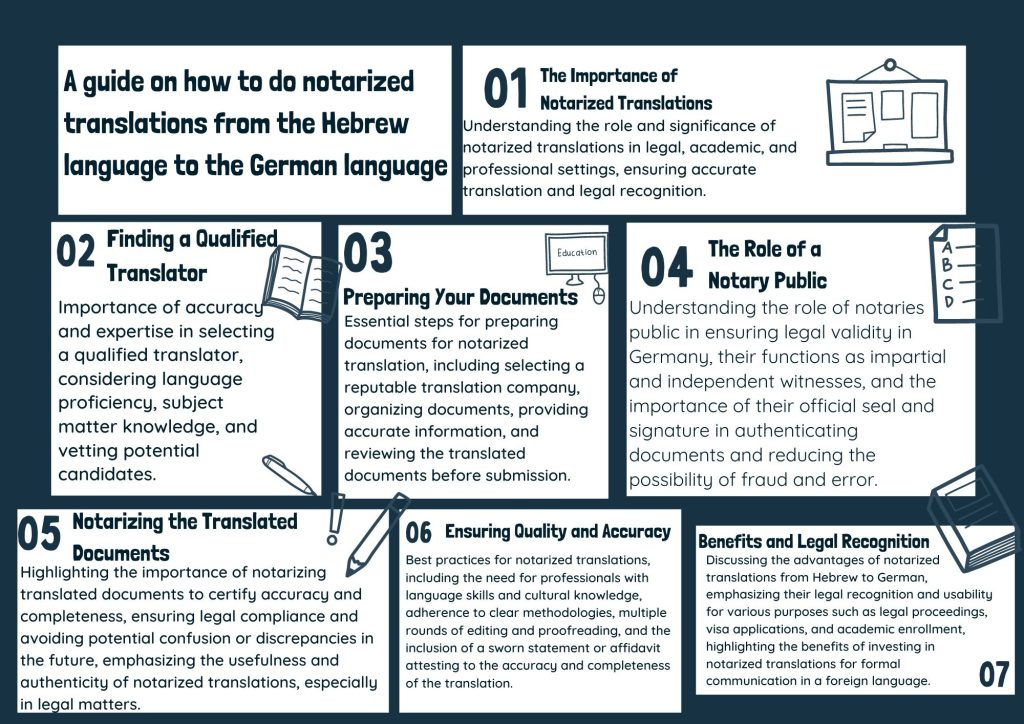Notarized translations play a crucial role in legal, academic, and professional settings. They are necessary to ensure that the content is not only accurately translated but also legally recognized and binding. By affixing a notary seal or signature, an authorized notary public certifies that the translation is true and accurate to the best of their knowledge. This adds a layer of authenticity and reliability to the translation, which can be critical in preserving the integrity of official documents. Whether you are applying for a visa or seeking to enroll in an international university, notarized translations can help facilitate the process and avoid any potential legal or bureaucratic issues. Ultimately, understanding the importance of notarized translations empowers individuals and organizations to navigate global challenges with confidence and professionalism.

The Importance of Notarized Translations: Understanding the Need
Notarized translations are an essential component of international communication. These translations must go through a rigorous and complex process to ensure accuracy and precision. A notary public is a licensed professional who verifies the authenticity of the translation, adding credibility and legality to the document. Without notarized translations, misunderstandings and confusion can arise, often with serious consequences. Whether it’s for legal documentation, medical records, or business transactions, notarized translations have become more important than ever in today’s globalized world. By engaging the services of a licensed notary public, individuals and organizations can ensure that their translations comply with legal requirements, making them eligible for use in official capacities anywhere in the world.
Finding a Qualified Translator: Ensuring Accuracy and Expertise
When it comes to finding a qualified translator, accuracy and expertise are critical components. In a globalized world, communication across varying languages and cultures is essential, but the slightest mistake or misinterpretation can lead to significant confusion or even offense. A skilled translator not only sees beyond word-for-word translations but also considers the nuances of language to deliver a message that is faithful to the source and culturally relevant to the target audience. In addition to language proficiency, a translator should possess knowledge of the subject matter they are translating. Hence, it is imperative to vet potential translators and ask for references, credentials, and samples of their work before selecting one. By doing so, one can ensure the accuracy and expertise required for clear and culturally sensitive communication.

Preparing Your Documents: Essential Steps for Notarized Translation
When it comes to notarized translations, preparation is key. Ensuring that your documents are properly translated and certified can save you time and money in the long run. To prepare for a notarized translation, there are several essential steps you’ll need to take. First, select a reputable translation company with experience in notarization and legal translation. Second, collect and organize all the documents that need to be translated. Third, provide accurate and complete information about the documents to be translated, including any special instructions or requirements. Finally, review and proofread the translated documents before submitting them for notarization. By following these steps, you can ensure that your notarized translations are accurate, reliable, and legally valid.
The Role of a Notary Public: Ensuring Legal Validity in Germany
Notaries public play a crucial role in ensuring that legal transactions in Germany are conducted in compliance with established laws and regulations. As impartial and independent witnesses, notaries provide an essential service by verifying the identity of signatories, authenticating documents, and reducing the possibility of fraud and error throughout the process. By affixing their official seal and signature to a document, notaries add a level of security and legitimacy that bolsters public trust in the legal system. Whether it’s a real estate sale, a will, or other significant legal agreement, the presence of a notary public assures all parties involved that the transaction is legally valid and binding. Without the assurance provided by notarization, legal disputes and challenges could arise, adding unnecessary cost and complexity to many court proceedings. Therefore, notaries’ work is an essential service in upholding the rule of law in Germany.
| Subtitle | Description |
| The Importance of Notarized Translations | Understanding the role and significance of notarized translations in legal, academic, and professional settings, ensuring accurate translation and legal recognition. |
| Finding a Qualified Translator | Importance of accuracy and expertise in selecting a qualified translator, considering language proficiency, subject matter knowledge, and vetting potential candidates. |
| Preparing Your Documents | Essential steps for preparing documents for notarized translation, including selecting a reputable translation company, organizing documents, providing accurate information, and reviewing the translated documents before submission. |
| The Role of a Notary Public | Understanding the role of notaries public in ensuring legal validity in Germany, their functions as impartial and independent witnesses, and the importance of their official seal and signature in authenticating documents and reducing the possibility of fraud and error. |
| Notarizing the Translated Documents | Highlighting the importance of notarizing translated documents to certify accuracy and completeness, ensuring legal compliance and avoiding potential confusion or discrepancies in the future, emphasizing the usefulness and authenticity of notarized translations, especially in legal matters. |
| Ensuring Quality and Accuracy | Best practices for notarized translations, including the need for professionals with language skills and cultural knowledge, adherence to clear methodologies, multiple rounds of editing and proofreading, and the inclusion of a sworn statement or affidavit attesting to the accuracy and completeness of the translation. |
| Benefits and Legal Recognition: Notarized Translations from Hebrew to German | Discussing the advantages of notarized translations from Hebrew to German, emphasizing their legal recognition and usability for various purposes such as legal proceedings, visa applications, and academic enrollment, highlighting the benefits of investing in notarized translations for formal communication in a foreign language. |
Notarizing the Translated Documents: Certifying Accuracy and Completeness
When it comes to legal documents, accuracy and completeness are of the utmost importance, especially in cases where they need to be translated. Notarizing these documents ensures that they meet the required standards and that they are legitimate. By certifying the accuracy and completeness of the translated document, notarizing can be the ultimate solution for any legal issues that may arise down the road. Not only does it protect all parties involved, but it also serves as a solution to avoid any confusion or discrepancies. Therefore, it is highly recommended that any translated document, especially in legal matters, be notarized for the sake of authenticity and usefulness.
Ensuring Quality and Accuracy: Best Practices for Notarized Translations
Notarized translations play a crucial role in ensuring accuracy and quality in legal documents, immigration papers, and other sensitive materials. Often required by law, these translations require utmost attention to detail and adherence to certain best practices. To ensure the highest level of accuracy, notarized translations must be performed by professionals with proven language skills and deep cultural knowledge. In addition, the translation process must follow a clear methodology, including multiple rounds of editing and proofreading. Finally, a sworn statement or affidavit must be included, stating that the translator attests to the accuracy and completeness of the translation. These best practices will ensure that the notarized translation meets its legal requirements and delivers the intended outcome with precision and reliability.

Benefits and Legal Recognition: The Advantages of Notarized Translations from Hebrew to German
When it comes to translating important documents from Hebrew to German, it’s imperative to ensure that the translation is not only accurate but formally recognized as well. This is where the benefits of notarized translations come into play. Notarized translations are translations that have been certified by a notary public, who acts as a legal authority to authenticate the accuracy and validity of the translation. By obtaining a notarized translation of your Hebrew documents into German, you can have peace of mind knowing that the translation is legally recognized and can be used for a variety of purposes such as legal proceedings, visa applications, and even academic enrollment. The advantages of notarized translations make it a wise investment for anyone who needs to communicate formally in a foreign language.




